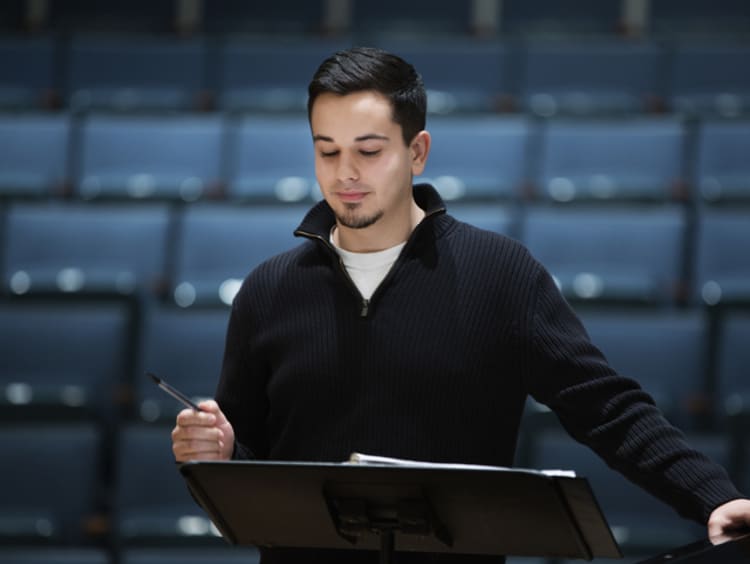What Does a Musical Director Do?

Have you ever seen a musical theater production or an opera that moved you emotionally? People who are passionate about music may look for ways to turn their passion into a career path. Plenty of different opportunities exist within the music industry.
However, if you have your sights set on a high-level position, you might consider becoming a musical director. Explore this in-depth guide about this exciting profession and consider earning a musical director degree to prepare for your career ambitions.
What Is a Music Director?
Musical theater productions incorporate sound to enhance the story, establish the setting and heighten the drama. The musical elements of a production elicit an emotional response from the audience. Sometimes, the music plays a significant role in telling the story. A musical director oversees the development, rehearsal and live performance of the musical elements of a show.
As an example, consider the movie “Jaws." When the shark appears, the audience hears dramatic music that heightens the suspense and invokes an emotional response. Similarly, a musical director’s goal is to use music in a theatrical production to engage the audience with the story emotionally.
What Does a Music Director Do?
You may be wondering about the specific tasks of this profession. Particular responsibilities vary depending on the employer and the musical production. In general, however, they may include any of the following:
- Developing the vision for the production’s musical accompaniment, such as selecting musical arrangements and compositions and interpreting musical scores
- Auditioning new performers and select guest performers and soloists
- Scheduling, coordinating and directing rehearsals, preparing the musical group for the live performance or recording session
- Providing feedback to section leaders and individual musicians, working toward improving the sound, style, rhythm and timing
- Consulting with other professionals, such as the sound designer and stage manager, to ensure the production is executed with a cohesive vision
The overall job of the music director is to conduct and lead the musical group. However, a music director can wear many hats, particularly at smaller companies.
Which Skills and Characteristics Are Important for a Music Director?
One of the essential skills in this industry is being an excellent musician. It is not uncommon for a director to be accomplished at playing multiple musical instruments. The piano is a good starting instrument for aspiring directors, as music directors often play the piano to accompany rehearsals. Other important skills include the following:
- Ability to read music and compose original scores
- Conducting skills
- Broad knowledge of various musical instruments
- Creative thinking
- Collaboration and teamwork
- Servant leadership or service
Where Do Music Directors Work?
Many music directors work as freelancers hired to oversee a particular production for a theater company, an opera company or even a university. Music recording companies and movie studios are other employers of these professionals. Some music directors are full-time, in-house employees. For example, a music director may work for a Broadway musical theater company, where he or she is responsible for overseeing multiple productions each year.
Beyond Broadway, opportunities exist at community or regional theaters and opera houses. At smaller, local theaters, the music director may wear multiple hats. He or she might collaborate with the play director to rehearse with the cast and the choir or orchestra.
Some music directors may work within religious organizations, including churches. Here, they are typically responsible for overseeing the musical aspects of each service, from coordinating the choir’s rehearsals to conducting a band during service to auditioning new singers. In a church or other worship service setting, the music director may be referred to as a worship leader or worship director.
Music directors may find work within a school setting. They may also become employed in places such as religious and civic organizations, performing arts companies or self-employment.*
Do I Need a Music Director Degree to Enter the Field?
Yes, it is customary for aspiring directors to earn a music degree. A bachelor’s degree is the minimum requirement. With an undergraduate degree, you may be prepared to pursue opportunities as a choir director or a music director at a community or regional theater. A bachelor’s degree will also serve you well if you aspire to compose popular music for record companies or movie studios. Also, a bachelor’s degree can qualify you to pursue a career in the worship arts.
Individuals who aspire to direct musical productions at larger theater companies and opera houses, such as those found on Broadway, will generally need a master’s degree. These employers may look for job candidates with a master’s degree in an area such as performance, music theory, conducting or music composition.
How Can I Become a Music Director?
When you are ready to apply to universities for an undergraduate degree, you should look for a school with a dynamic performing arts department. Try finding one that holds theatrical productions you can participate in regularly. Your experience will add merit to your resume and give you invaluable experience.
There is no one universally accepted music director degree program. Instead, look for a relevant Bachelor of Arts in Music degree, such as one that specializes in instrumental performance, vocal performance or orchestral instruments. If you aspire to lead musical performances within a religious setting, look for a degree program aligned with the worship arts.
After graduating, you are ready to look for work. Note that the music director is quite often at the top of the hierarchy within a theater company or opera house. You must first gain work experience at lower-level positions. You may start as an assistant to the director or as an orchestra pit musician.
During these early years of your career, it is in your best interest to continually seek additional responsibilities above and beyond your job description. This work ethic will make you a prime candidate for a promotion. You will also gain experience to use as a springboard to eventually interview for a music director position.
Grand Canyon University offers a broad range of performing arts bachelor’s degrees. Examples of degree programs that might interest an aspiring musical director include the Bachelor of Arts in Music with an Emphasis in Instrumental Performance degree, the Bachelor of Arts in Worship Arts with an Emphasis in Media and Production Ministry degree and the Bachelor of Arts in Music Education-Instrumental: Brass, Woodwind, Percussion, or Strings degree. Click on Request Info at the top of your screen to learn more about pursuing your passion at GCU.
*Retrieved from: Occupational Outlook Handbook, Music Directors and Composers in March 2021.
The views and opinions expressed in this article are those of the author’s and do not necessarily reflect the official policy or position of Grand Canyon University. Any sources cited were accurate as of the publish date.


